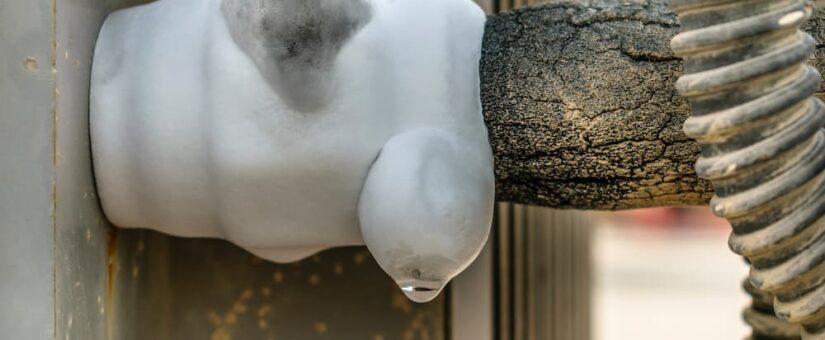
- On October 5, 2023
Have you noticed water puddling near your AC unit? It’s a common concern among homeowners, especially during the hot Arizona summers. While an air conditioner doesn’t primarily function using water, there are certain situations where moisture can play a part. From the experts at Howard Air & Plumbing, this guide explains why your AC might appear to be “leaking” water – and what to do about it.
Does Air Conditioning Use Water?
The short answer to this common question is no; your AC doesn’t use water.
Unlike some other home appliances, a central air conditioner doesn’t rely on water for its core operation. Unlike swamp coolers or boilers, the AC is not connected to a water supply line or tank. Central air conditioners are not designed to be linked to a water line or to store water in a tank. Their primary function is to circulate refrigerant to achieve cooling, completely separate from a home’s water system.
Why is There Water Around My AC Unit?
There’s usually a simple explanation if you’ve discovered water around your AC.
Condensation
Your air conditioner doesn’t just cool the air. One of its key roles is to function as a dehumidifier. As the humid, warm air inside your home passes over the AC’s cold coils, condensation forms, similar to how water droplets appear on the exterior of a cold drink on a warm day.
The AC is equipped with a condensate drain pan to handle this moisture. This pan collects the formed water droplets. Once collected, the water is channeled out and away from both the AC and your home through a connected drain line. However, if there’s an issue like a blockage in the line or the pan isn’t aligned right, you might notice that puddle of water near your unit.
Ice Melt
On certain occasions, especially when there’s restricted airflow or a refrigerant problem, parts of your AC can actually freeze.
When these frozen components start to thaw, they produce water. If there’s too much melting at once, the water volume can exceed what the condensate pan can handle. This overflow can then be the source of those mysterious water pools you might find around the AC.
Other Reasons for Water Around the AC
An incorrectly installed AC, very humid indoor air, or an old AC system can also cause more condensation than usual. This extra water can lead to leaks if the system can’t handle it.
- A properly installed air conditioner is crucial for its efficient operation. When an AC is incorrectly installed, it might not function optimally, leading to imbalances in the cooling process. This can result in excessive condensation. For instance, an AC that isn’t level might not drain condensation effectively. Similarly, poorly connected components might lead to water escape routes, causing leaks.
- The amount of moisture an air conditioner extracts depends on the humidity level inside your home. When your indoor air is exceptionally humid, the AC works harder to remove this excess moisture. However, if the humidity levels are consistently high, the system might produce more condensation than it’s designed to handle. This becomes especially pronounced during the peak of summer or in areas with a naturally humid climate.
- As an air conditioning system ages, its efficiency can decline. Components wear out, and the system might not regulate moisture as effectively as it once did. Seals can degrade, drain pans might corrode, and even the condensate line can become less efficient due to years of mineral buildup. An older system may need help managing the water it condenses from the air, resulting in potential overflows and leaks.
In all these situations, it’s essential to monitor your AC closely. If you notice consistent water pools or the system seems to struggle on humid days, it might be time for a maintenance check or upgrade.
Howard Air & Plumbing: Your Partner in AC Troubleshooting
Spotting water around your AC unit can be worrisome, especially when you’re trying to beat the heat. Howard Air & Plumbing understands the intricacies of air conditioning systems inside and out. With years of experience in the field, our team is well-equipped to diagnose and rectify any issues that may cause your AC to appear to “leak” water.
Whether it’s a simple realignment, a thorough cleaning, or more complex repairs, our team is dedicated to ensuring your home remains a cool and comfortable haven. With our prompt service, high-quality HVAC installations, and exceptional repair services, homeowners can rest assured they’re in capable hands. And for those looking to upgrade or invest in the latest models, do check out our showroom and special deals for unbeatable offers.
How to Get Water Out of an AC Unit
While the first impulse might be to solve the problem on your own, it’s crucial to approach the situation with care. Here’s a basic guide on handling water around your AC unit:
- Safety First: Before diving into any fix, make sure to switch off the power to your air conditioning unit. It’s always better to be safe, ensuring that there’s no electricity running while you work.
- Examine the Drain Line: Gently inspect the tubing and other parts around your AC. If you spot any leaks, cracks, or damage, it’s a telltale sign that certain components need replacement. Remember, sometimes the damage isn’t visible to the naked eye, so a professional assessment is generally the best route.
- Water Removal: If your drain pan is holding stagnant water, you can use a wet/dry shop vacuum to clear it out. These vacuums can effectively suction out the water, ensuring no residue is left behind.
- Clear Out Debris: Once the water is out, inspect the drain for any clogs, sludge, or debris. The exterior drain outlet should also be checked for blockages. Everyday culprits include garden mulch, leaves, or other yard debris.
- Unclogging the Drainpipe: If you feel comfortable, you can attempt to gently clear any obstructions from the drainpipe using a small wire brush. Following this, a mixture of bleach and water (equal parts) can help eliminate lingering algae or mold. Remember to wear appropriate protective gear for your hands and eyes. If you need clarification on this step, it’s best to consult with a professional.
- Power Up: After ensuring all issues are addressed and everything is clean, you can restore power to your AC unit. Give it some time; if it doesn’t kick into action promptly, try switching it off and on after a brief interval.
- Seek Expertise: If you’ve gone through these steps and still encounter issues or are uncomfortable handling any part of the process, that’s okay! Our team at Howard Air & Plumbing is here to assist you. Sometimes, DIY fixes can unintentionally make the problem worse. To ensure your AC unit’s longevity and optimal performance, involving experts in maintenance and repair tasks is always a good idea.
Stay Informed and Stay Cool with Howard Air & Plumbing
Water around your AC can be a red flag, but with the right knowledge and the right team by your side, it’s an issue that can be quickly addressed. Remember, regular maintenance is key to preventing such problems in the first place. If you ever notice water around your AC, don’t wait; reach out to professionals like Howard Air & Plumbing to ensure your system operates efficiently, safely, and water-free.
At Howard Air & Plumbing, we’re more than just service providers; we’re your partners in comfort and safety in your home. If you have concerns about your AC, please feel free to contact us at any time.
Image Credit: Magsi / Shutterstock

















0 Comments